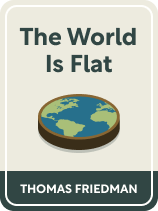

This article is an excerpt from the Shortform book guide to "The World Is Flat" by Thomas L. Friedman. Shortform has the world's best summaries and analyses of books you should be reading.
Like this article? Sign up for a free trial here.
How does technology bring the world together? How has it made the world “flatter”?
In The World Is Flat, Friedman argues that technological advancements helped put globalization into overdrive because people and businesses from around the world could now collaborate and trade hyper-efficiently. He discusses the impact that’s been made by PCs, the internet, search engines, and more.
Continue reading to understand the role of technology in globalization, according to Thomas L. Friedman.
The Role of Technology in Globalization
The role of technology in globalization began with the emergence of personal computers (PCs) in the 1980s and ’90s, which allowed people to use relatively inexpensive machines to create, store, and manipulate digital content (words, art, music, data, and video). Then, the internet and World Wide Web (the “web”) allowed people to post this content for anyone to access.
Web browsers and web protocols developed in the ’80s and ’90s made the internet even more useful. Commercial web browsers paved the way for the internet as we know it today by giving people the ability to easily access digital content and display it on their screens. Standardized web protocols, meanwhile, allowed the internet to be a truly interconnected and integrated network by making it possible to transmit and access content no matter the type of computer or software you’re using.
Once PCs became widespread and the internet, the web, web browsers, and web protocols were widely adopted, people and businesses could create, share, and work together from all corners of the world. For example, with a PC, you can type up a business report, edit it, and add pictures, graphs, or videos, all from your living room or office. With the web, you can put it on a webpage for anyone to see. Then, using web browsers, people can pull up the report with just a few clicks. And because of web protocols, they can do this from any device.
| Globalization and Technology In Zero to One, venture capitalist Peter Thiel compares technological advancements with globalization. While Friedman sees new technology as a key driver of globalization, Thiel sees them as two different forms of progress: New technology is a form of vertical progress because it creates something out of nothing. Globalization, on the other hand, is a form of horizontal progress—it occurs when existing technologies, products, or methods of production are spread around the world. Thiel agrees with Friedman that globalization will lead to a more homogeneous world, and standards of living across the globe will become more equal as a result. But he also notes a potential downside: A more homogeneous society might lead to conflict instead of progress. As the world becomes more homogenous, people will be competing for the same limited resources. As technology allows China to become a manufacturing powerhouse, for example, that country will require more energy in the form of oil, which may lead to conflict with other nations. |
The Emergence of Search Engines
The development of search engines greatly enhanced people’s ability not only to inform themselves but to collaborate on a much larger scale. With Google and other search engines, people have access to an enormous amount of information, which they can use in unprecedented ways: People use search engines to find friends, communities, and collaborators across the world. They can also uncover new sources of information. Search engines level the global playing field perhaps more than anything else because they open up a world of possibilities to billions of people.
| The Power of Search Engine Optimization To understand how important search engines are to individuals and businesses, we can look at the search engine optimization (SEO) market. SEO is the process of increasing website traffic by moving that website higher on the list of search engine results. Companies pay SEO firms to ensure their e-commerce website is a top result of a Google search because this will get them more clicks and make them more money. The global SEO services market was $51 billion in 2021, and it is expected to grow to $134 billion by 2026. Companies have good reason to pay for SEO: Studies have found that people are inherently biased toward top search engine results, regardless of their relevance. Indeed, the first result in a Google search is clicked over 25% of the time, compared to 5.1% for the sixth-highest result. However, our trust in a search engine’s ability to rank websites by their relevance to the query can lead to undesired consequences. A top result of a search engine could be irrelevant, biased, or misleading, but because it’s the top result, it will get a lot more clicks. Furthermore, once a site is high on a search engine’s results, it’s difficult for smaller or lesser-known sites to gain traction. This could undermine a searcher’s ability to find good connections or information. |

———End of Preview———
Like what you just read? Read the rest of the world's best book summary and analysis of Thomas L. Friedman's "The World Is Flat" at Shortform.
Here's what you'll find in our full The World Is Flat summary:
- How the world is becoming one globalized society
- The potential costs and benefits of a flatter world
- How you can best contribute to a globalized society





